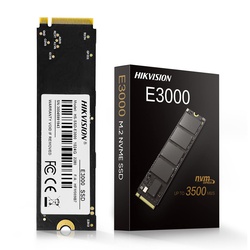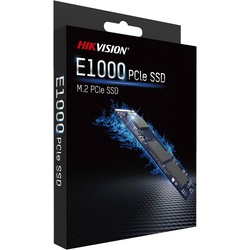
HIKVISION E1000 INTERNAL SSD M.2 PCIe Gen 3*4 NVMe 2280 - 512GB - HS-SSD-E1000-512G
by Hikvision
Hikvision E1000 Internal SSD is designed to offer high-speed data transfer and quick access times due to its M.2 PCIe Gen 3*4 NVMe interface. It's suitable for systems that require fast storage, such as gaming computers, content creation workstations, and high-performance laptops. The compact M.2 form factor also makes it convenient for use in systems with limited space
- High-Speed Performance: The SSD utilizes the PCIe Gen 3*4 NVMe interface, allowing for fast data transfer rates and reduced latency compared to traditional SATA SSDs. This makes it suitable for tasks that demand quick data access, such as booting up the operating system, loading applications, and transferring large files.
- M.2 Form Factor: With the compact M.2 form factor, the SSD is space-efficient and doesn't require traditional data cables. It can be directly attached to a compatible M.2 slot on the motherboard, freeing up space within the computer case.
- Large Storage Capacity: The 512GB storage capacity offers ample space for storing various types of files, including applications, documents, videos, and more. It can also be a primary storage solution for systems where speed and capacity are both important.
- Reliable Solid-State Design: Being an SSD, it lacks moving parts found in traditional hard drives. This makes it more durable and resistant to physical shocks, which can help safeguard your data and ensure reliable long-term performance.
- NVMe Protocol: The use of NVMe protocol enhances performance by taking advantage of the direct connection between the SSD and the CPU, reducing latency and maximizing data throughput.
| SKU | 1768 |
|---|
Reviews
This product does not have any reviews yet.
Add your reviewDescription
HIKVISION E1000 INTERNAL SSD M.2 PCIe Gen 3*4 NVMe 2280 - 512GB - HS-SSD-E1000-512G
The Hikvision E1000 Internal SSD you've mentioned is a type of solid-state drive (SSD) designed for internal installation within a computer system. It utilizes the M.2 form factor, which is a compact and slim design that allows it to be directly connected to a compatible M.2 slot on the computer's motherboard.
The "2280" specification indicates the physical dimensions of the SSD. In this context, "2280" refers to the length and width of the SSD in millimeters. Specifically, it means that the SSD is 80mm long and 22mm wide.
The "M.2 PCIe Gen 3*4 NVMe" description provides further details about the SSD's performance and interface:
-
M.2: This indicates the physical form factor and connector type of the SSD.
-
PCIe: Stands for Peripheral Component Interconnect Express, which is a high-speed interface used to connect various internal components in a computer. PCIe SSDs are known for their faster data transfer rates compared to SATA SSDs.
-
Gen 3*4: This refers to the PCIe generation and the number of available lanes for data transmission. "Gen 3" signifies that it uses the third generation of the PCIe interface, and "4" indicates that it utilizes four lanes for data transfer, providing higher bandwidth.
-
NVMe: Stands for Non-Volatile Memory Express, which is a protocol designed specifically for SSDs. NVMe SSDs are known for their low latency and high performance, making them ideal for applications that require quick data access.
-
512GB: Indicates the storage capacity of the SSD, which in this case is 512 gigabytes. This is the amount of data that the SSD can store.
-
Features
-
-
High-Speed Performance: The SSD utilizes the PCIe Gen 3*4 NVMe interface, allowing for fast data transfer rates and reduced latency compared to traditional SATA SSDs. This makes it suitable for tasks that demand quick data access, such as booting up the operating system, loading applications, and transferring large files.
-
M.2 Form Factor: With the compact M.2 form factor, the SSD is space-efficient and doesn't require traditional data cables. It can be directly attached to a compatible M.2 slot on the motherboard, freeing up space within the computer case.
-
Large Storage Capacity: The 512GB storage capacity offers ample space for storing various types of files, including applications, documents, videos, and more. It can also be a primary storage solution for systems where speed and capacity are both important.
-
Reliable Solid-State Design: Being an SSD, it lacks moving parts found in traditional hard drives. This makes it more durable and resistant to physical shocks, which can help safeguard your data and ensure reliable long-term performance.
-
NVMe Protocol: The use of NVMe protocol enhances performance by taking advantage of the direct connection between the SSD and the CPU, reducing latency and maximizing data throughput.
-
Thermal Management: Some M.2 SSDs, including the Hikvision E1000, come equipped with thermal management solutions such as heatsinks or heat spreaders. These features help dissipate heat generated during intensive read and write operations, preventing thermal throttling that can impact performance.
-
Compatibility: The SSD is designed to work with systems that support the M.2 PCIe Gen 3*4 NVMe interface. It's important to ensure that your motherboard has a compatible M.2 slot before purchasing this SSD.
-
Energy Efficiency: SSDs generally consume less power compared to traditional hard drives, which can result in longer battery life for laptops and lower energy bills for desktops.
-
Upgrade Potential: The Hikvision E1000 SSD can serve as an upgrade option for older systems looking to benefit from the speed and reliability of SSD technology. It can breathe new life into aging computers.
-
Software and Firmware Support: Depending on the manufacturer, the SSD might come with management software that allows you to monitor its health, update firmware, and potentially optimize its performance.
-






